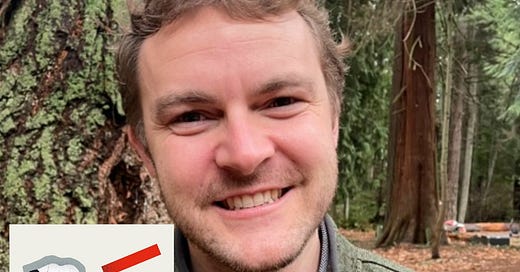Just Tell Them: A conversation with Zach Groshell
Explaining things well is both art and science, the educator writes in a new book
I’m excited to bring you another Bell Ringer special: a long-form, in-depth conversation with a top educator in the growing science of learning field. Instructional coach, author and podcaster Zach Groshell has a new book out November 26 on how teachers can use explanation to improve student learning. Check it out below—and as always, get everything The Bell Ringer has to offer by becoming a paying subscriber.
If I had to boil down all the education reporting I’ve done in the last decade into just one phrase—I’m imagining something like Michael Pollan’s famous “Eat food. Not too much. Mostly plants.”—mine would be, “Teaching matters.”
Teaching matters. Does it sound obvious? Not to me. So much of how the public views education is tangled up in all these other things—how public schools are run, flavor-of-the-day fights over curriculum and how to spend the budget, and of course the thousands of things over which educators have little control—that maybe we forget how special it is, our species’ ability to show kids how to read, how to do math, how to write well and become a knowledgeable and compassionate citizen. How teachers teach, and what they teach, makes an enormous difference in the life of a child.
Many parents I talk with are often concerned about all the other stuff at school: the environment, the extra-curriculars and the philosophy—whether it’s a STEM school, Montessori-based, etc. I think a lot of families are also concerned about the safety of their schools, for obvious and incredibly depressing reasons. These are all important.
But what happens between teacher and students all day, and how that accumulates over time—that matters.
I had a recent, early-morning, nearly pre-coffee conversation about teaching with former elementary school teacher Zach Groshell. Groshell, now an instructional coach and education consultant, hosts the Progressively Incorrect podcast, and has been interviewed before here at The Bell Ringer. And he’s written a new book, out November 26, called Just Tell Them: The Power of Explanations and Explicit Teaching.
Groshell’s ideas on explanations, all supported by research, get at the very heart of teaching—how to give information to students, and how to make sure they got it. He describes the book as “short and snappy” and “straight to the point,” with the goal being to use the best research available to just tell teachers how to do explicit teaching well—because educators, like kids, don’t have a lot of time to waste.
One thing Groshell said months ago on X (formerly Twitter) still lives in my head: It's near impossible to complete advanced coursework without foundational skills in place. These prerequisites require more practice and reinforcement than we often estimate. So, we move under-practiced kids on to the next level, where they are made to feel like failures.
For a lot of kids, that means a lot more “teacher talk” than they’re probably currently getting—something that many teachers are either persuaded or taught not to do. Teachers often get the idea, Groshell said, that explaining things to kids will harm their development or curiosity. He used to think that, too—he used to be the teacher with posterboard all over the floor and projects spilling out into the hallway. (More on that below.) But later, he began to understand what real learning actually looks like. And often—not always—it means much more teacher talk than he was used to.
Hoping you’ll join me in the comments for some conversation about this important topic. Now on to the interview:
The Bell Ringer: What was the impetus to write the book? What were you seeing in classrooms that made you think that teachers and maybe principals, maybe even parents, need this book?
Zach Groshell: The main thing is the importance of talking about guidance, and developing a type of teaching that really goes away from what a lot of us learned in teacher school. Which was that the cooler, groovier version of teaching—something that's more exciting for classrooms—means you try your best to use explanation as a last resort.
As an instructional coach, I would walk around classrooms and I'd see the teacher, and they'd be looking at me as they're doing a math lesson. I'd walk up to them and say,
Yeah, it might be about time to explain it to them.
And the teachers would look at me and say, Really, now? Now?
I’d say, Yeah, yeah, just tell them.





